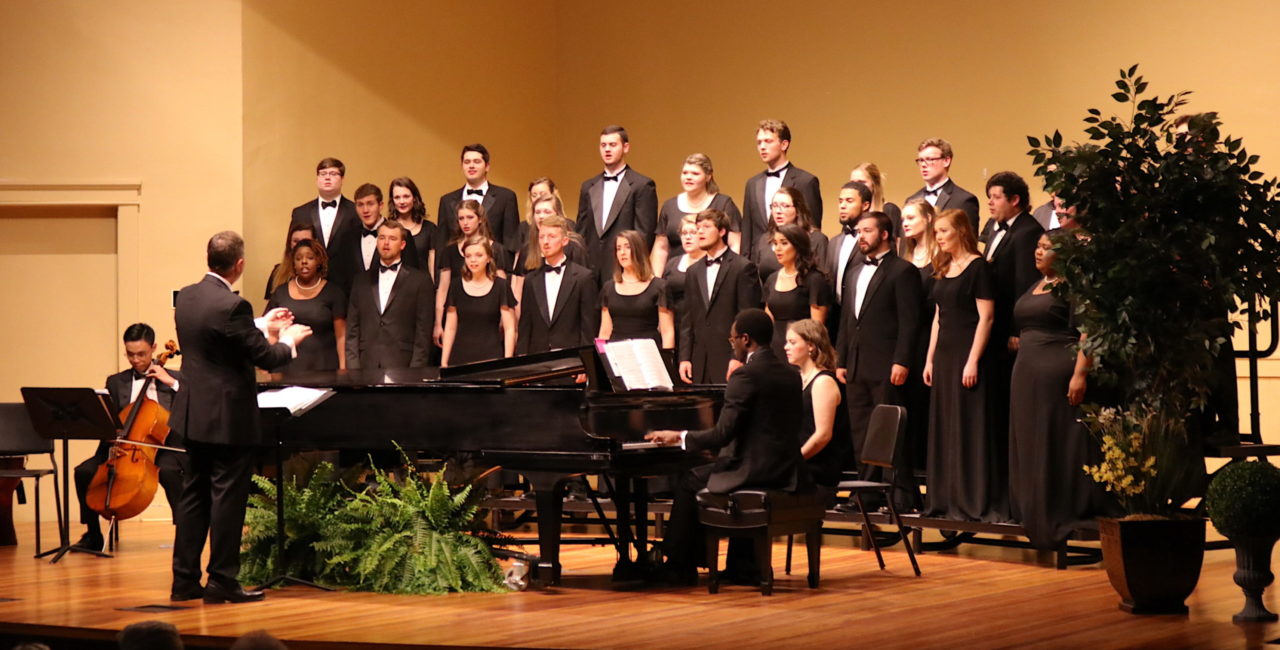
Music at Erskine: classroom, rehearsal, performance, and more
Music plays a significant role in carrying out Erskine’s mission “to glorify God as a Christian academic community.”
The Department of Music attracts talented students as music and music education majors and draws into its orbit students from a variety of other majors who join the Choraleers, Sinfonia, and other Erskine ensembles.
Members of the music faculty engage not only in teaching, mentoring, and conducting, but also in musical endeavors off campus, enriching their professional lives and ultimately benefitting their students.
Traveling with the band
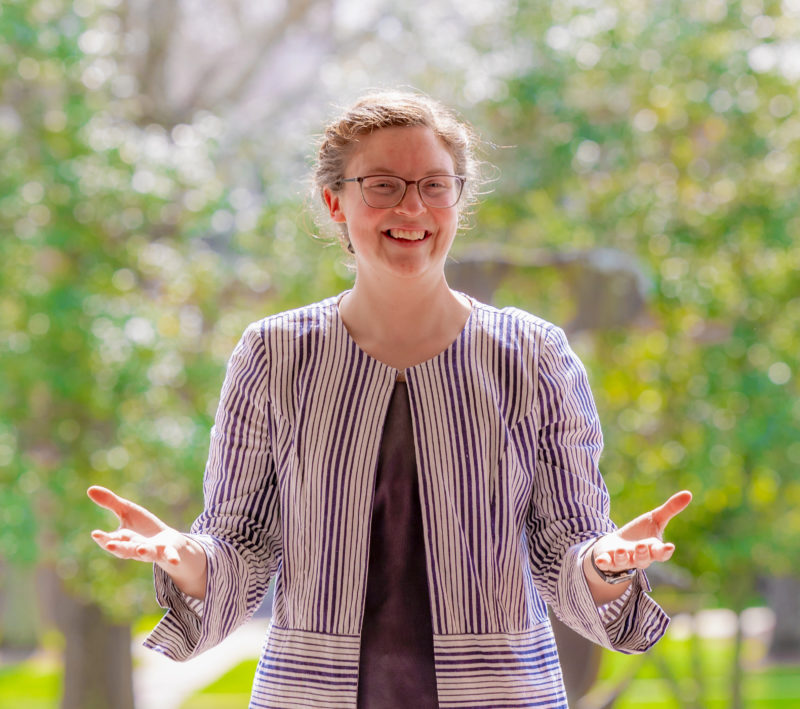
Assistant Professor of Music Dr. Deborah Caldwell, who conducts the instrumental ensemble Sinfonia and plays the trumpet herself, traveled with The King’s Brass—an ensemble which influenced the growth of brass instrument use in worship music—during the 2021-22 season.
“King’s Brass combined three of my favorite things—people, music, and travel—all with a kingdom-building focus,” she says. “It was such a joy to be on the team!”
She has also played with the Augusta Choral Society and served as principal solo cornet with the South Carolina Brass Band.
“All these opportunities fuel ‘real life’ stories I can give to my students,” Caldwell says. “This could be about the nuts and bolts of music—music theory—or about recording studios, performance practice, tour life, or the community you find within a group of musicians.”
Earlier in her life, Caldwell harbored doubts about seeking a career in music. Strong in her Christian faith, she especially admired people who served others in practical ways.
“I was always a little wary of pursuing the arts,” Caldwell says. “But the Lord has taught me that just as some people serve others by feeding them or building them a house, some serve others by nourishing their souls and spirits.”
Christian musicianship runs the gamut from celebrated professional performances to dedicated amateur efforts, but in her own life, Caldwell has seen its power.
“I don’t always know how it happens, and I can’t force it,” she says, “but God does take our finite gifts and uses them to bless others.”
Building up his alma mater
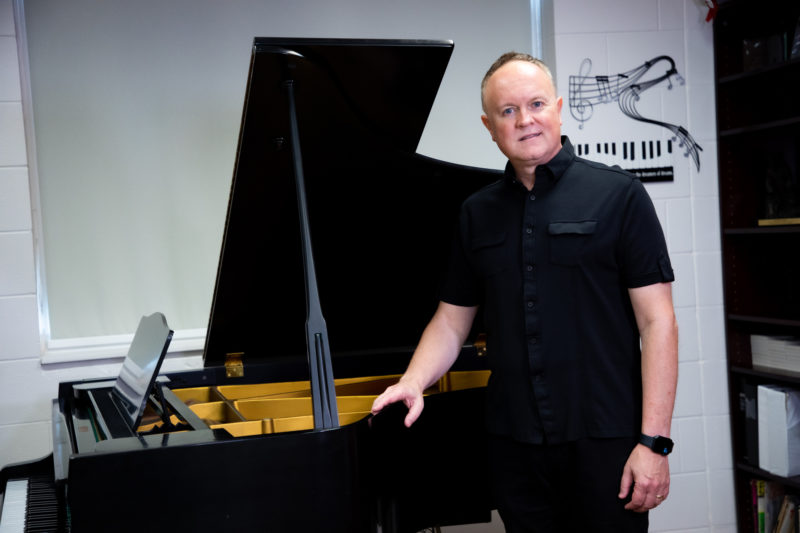
Then there’s Associate Professor of Music Dr. Keith Timms, a 1984 graduate of Erskine College, who conducts the Choraleers. He makes many contributions to the music community and recently reworked Erskine’s Music Education major.
Timms serves as a judge for choral events throughout the Southeast. Thanks to his efforts and those of others in the Erskine community, the Erskine campus is the upstate region site for the upcoming High School Choral Performance Assessment sponsored by the South Carolina Music Educators Association.
“The ability to showcase Erskine College and our music facilities to a concentrated population of quality choral musicians and their teachers is a valuable opportunity for our department,” he says.
An adjudicator for the Choral Division of the South Carolina American Choral Directors Association Solo and Ensemble Competition as well as for the Palmetto State Choral Championship, Timms judges choral competitions for Music in the Parks at Carowinds and Dollywood each year. He also serves as an adjudicator for vocal auditions for CS Music and Classical Singer Magazine.
Having spent many years as a high school music teacher, Timms brought experience, knowledge, and dedication to the task of revamping the Music Education major. He believes in Erskine’s value as a small Christian liberal arts college and says, “The size of our institution must never limit the level of education our students receive.”
Gaining inspiration
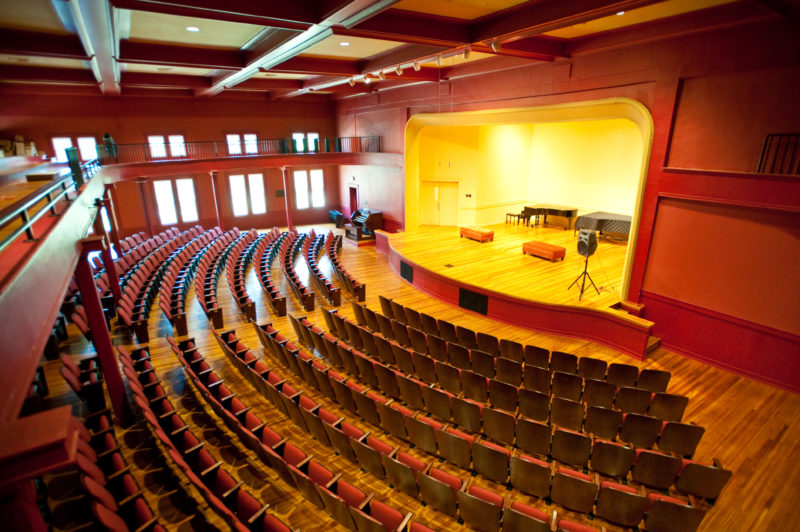
In addition to her work as teacher and accompanist at Erskine, Assistant Professor of Music Sharalynn Hicks, an accomplished pianist, enjoys serving as a church musician and as an audition judge with the National Guild of Piano Teachers. She is nationally certified with the Music Teachers’ National Association (MTNA). Serving as a church musician and as an audition judge helps to broaden her perspective, which contributes to the quality of her teaching.
Hicks serves as administrator for the MasterWorks Festival, a faith-based summer music program. Colleague Dr. Deborah Caldwell calls MasterWorks “the preeminent Christian music teaching festival in the nation.” In her work with the festival, Hicks uses skills not usually associated with artistic endeavor, yet her success depends on her vocation as a musician.
“As an administrator, I facilitate many aspects of the festival, from the student application process to competitive auditions to the logistics of running a residential summer program,” she says. “As a musician, I understand the complexities of what goes into each successful collaboration and performance, enabling me to serve effectively in an administrative role.”
The MasterWorks Festival entails hard work for Hicks during the summer, a season when many college professors enjoy a relaxed schedule. Why does she do it? Her reason might go back to the Erskine mission “to glorify God as a Christian academic community.”
Students who participate in the MasterWorks Festival can see how professional musicians “shine, not only in their vocations, but as lights for Christ in the professional world,” and can also observe “what a faith-based approach to a professional music career looks like,” Hicks says.
The MasterWorks Festival is an inspiration to Hicks, she says. It keeps her in touch with “the prevailing achievement levels of students across the country” and helps her “in mentoring students to strive for their personal best while working toward a higher level of excellence.”
Learning about the past, looking to the future
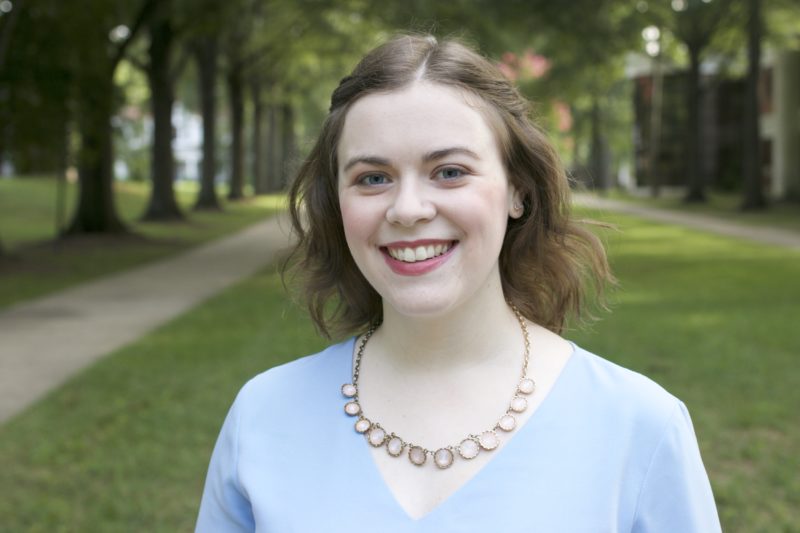
Applied Voice Instructor Dr. Hannah Timms (daughter of Dr. Keith Timms and adjunct instructor of mathematics Amy Timms) is planning to travel thousands of miles this summer to give a presentation at the 2023 College Music Society International Conference in the Baltic states of Estonia, Latvia, and Lithuania.
A 2014 graduate of Erskine College, where she double majored in music and English, Timms went on to earn a master’s degree in vocal performance from Winthrop University and a Doctor of Musical Arts (DMA) degree in vocal performance from Shenandoah Conservatory, where she received the Dean’s Graduate Scholar Award.
“My presentation will cover a portion of the material I used in my doctoral research,” she says. “I will perform and discuss a song cycle by Lithuanian composer Feliksas Bajoras.” The title of the song cycle —”Kodėl?”—is translated “Why?”
Timms developed an interest in the music of Lithuania in 2017, when she traveled to that country with the Erskine Choraleers on a mission trip. As she learned about the music and history of the region, she discovered that Lithuania, Latvia, and Estonia took part in a “Singing Rebellion” against the Soviets.
While conducting research in Lithuanian history and music history, she encountered the music of Bajoras. “I thought he had an interesting point of view as a composer whose career was mostly during the years of Soviet occupation,” she says. “From there, I selected vocal works that showed his compositional progression, as well as forms of protest against the Soviets.”
The young instructor’s presentation at the conference will focus on how Bajoras’s music “promoted Lithuanian culture and political interests in a time when they were controlled by the Soviet Union and free speech and creative expression were censored.”
In addition to serving as a voice instructor at Erskine, Timms teaches history and theory courses for music majors. She says that while class materials give an overview of composers in Imperial Russia and in the Soviet Union, she can offer students “better insight into the artistic climate of this region within the last 150 years,” thanks to her research.
“Whether it’s the Lithuanian melody played at the beginning of Stravinsky’s Rite of Spring or an explanation of the strictures of Socialist Realism for composers such as Shostakovich, I am able to better define music trends for our students,” she says, and adds, “My research into this time period and region may be incorporated into ‘special topics’ music courses in the future.”
